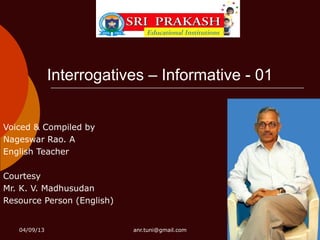Interrogatives informative - 01
•Download as PPT, PDF•
0 likes•128 views
Report
Share
Report
Share

Recommended
More Related Content
Viewers also liked
Viewers also liked (12)
Synthesis of two sentences using Present Participles.

Synthesis of two sentences using Present Participles.
Similar to Interrogatives informative - 01
Similar to Interrogatives informative - 01 (8)
Clause (Part-8 of 10)-Difference between an adjective and a noun clause

Clause (Part-8 of 10)-Difference between an adjective and a noun clause
More from Sri Prakash Vidya Niketan
More from Sri Prakash Vidya Niketan (20)
ఏ ఏ సందర్బాలలో ఇంగ్లీష్ లో ‘Say’ ‘tell’ ఉపయోగించాలి.

ఏ ఏ సందర్బాలలో ఇంగ్లీష్ లో ‘Say’ ‘tell’ ఉపయోగించాలి.
Interrogatives informative - 01
- 1. Interrogatives – Informative - 01 Voiced & Compiled by Nageswar Rao. A English Teacher Courtesy Mr. K. V. Madhusudan Resource Person (English) 04/09/13 anr.tuni@gmail.com
- 2. In this lesson let us learn how to frame an interrogative sentence, in order to get information as it is necessary to continue our communication with others. We use ‘Wh’ words to get some information about the other partner participated in our communication. We use ‘Who or What’ to ask about subject. Ramesh has stolen my book. Who has stolen my book? Somebody knocked the door. Who knocked the door? (Please remember we should not ask Who did knock the door? Ramesh likes oranges. Who likes oranges? Something happened. What happened? Something made me ill. What made me ill? 04/09/13 anr.tuni@gmail.com
- 3. To ask about object also we use ‘What’. I bought a new T.V. What did you buy? Ashok called me. Who did Ashok call? She wanted my help. What did she want? To ask about the profession we use ‘What’ My father is a teacher. What is your father? My brother is a doctor. What is your brother? My neighbour is a tailor. What is your neighbour? 04/09/13 anr.tuni@gmail.com
- 4. Visit us at “ayalasomayajula nageswar rao” For More videos on Functional & Usage Grammar. Subscribe to our channel on You Tube 04/09/13 anr.tuni@gmail.com
